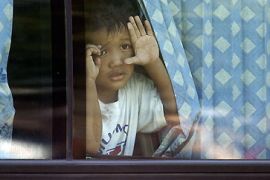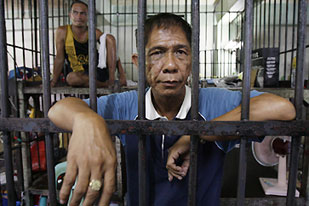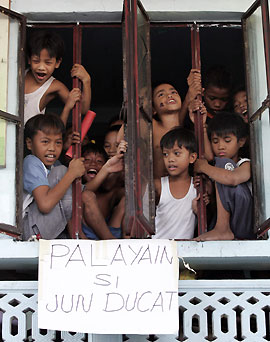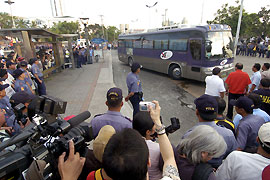Hostage drama divides Philippines
Families of child hostages say man behind Manila bus siege is a hero.

 |
| Police say Jun Ducat is facing multiple criminal charges [Reuters] |
The Philippines came to a standstill on Wednesday as a self-styled Robin Hood held some 30 underprivileged schoolchildren hostage inside a bus for over 10 hours.
The children had thought their benefactor was taking them on a field trip. Instead Jun Ducat stopped the bus in front of the City Hall in central Manila and, armed with a grenade and a machine gun, he demanded to speak to the media.
Over the following hours, the story unfolded live on television and radio. Even the president was glued to a monitor.
With an audience of millions, Ducat read out his demands. He wanted an end to poverty and the injustices of what he called a corrupt government.
|
e loves these kids so we knew he’d never hurt them |
The crowd at the scene grew, and in the end the stand-off reached the peaceful conclusion that everyone had hoped for.
But throughout the drama the police seemed largely powerless to control the situation. There was only one man directing this circus – and he was on the bus.
Jun Ducat reportedly grew up in one of Manila’s poorest areas. He became an engineer, developed high-powered friends, and then decided to “give back” to his community.
In the shanty towns of Tondo he is known for his socio-civic projects. He built the school the hostage children were from and is seen by most as a hero.
‘Papa’ Ducat
 |
| A placard in Tondo reads “Free Jun Ducat” [Reuters] |
In Tondo Ducat’s name has become synonymous with hope: It is written on the walls of the school he built and the uniforms of the children, many of whom refer to him as “papa”.
He was even meant to be running in the May local elections.
“Yes I’d vote for him,” says local resident, Roland Omoro. “He’s done so much for us.”
But this was not the first time Ducat had caused a public disturbance.
He held two priests hostage in the 1980s due to a misunderstanding over money, and in 1995 he went on a hunger strike on top of a public monument over another social grievance.
Now several politicians have suggested the whole school bus drama was in fact an orchestrated event aimed at the widest possible audience for political gain.
Ducat now faces multiple criminal charges and is being held in prison without bail.
The government agreed to his demands that they ensure the children’s further education, but the president has labelled Ducat himself a “prank-terrorist”.
She has vowed to punish him with the full force of the law.
Voice for grievances
 |
| The bus drama gripped the Philippines and much of the world [AFP] |
The hostage crisis may now be over, but it has sparked a national debate.
In a country where more than 60 per cent are held hostage by poverty and the marginalised feel unheard, many feel Ducat merely gave voice to their grievances.
Despite what the government says, in the slums of Tondo most say that Ducat should not be prosecuted.
“It got us heard didn’t it?” said one Tondo resident. “The problem with this government is they never bother with us small people. But he did. He helped us”
Even the families of the children he held hostage say they will not be pressing charges.
The mother of six-year-old Aaron, one of the hostages, told Al Jazeera she was initially terrified when she heard her son was being held hostage, but stopped worrying once she found out that Ducat was behind it.
“We were shocked that he could do this. But he loves these kids so we knew he’d never hurt them.”
The “hero” of Manila’s poor, the families say, should not be punished for finding a way to be heard.